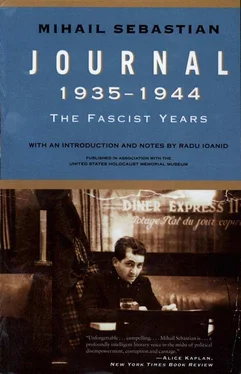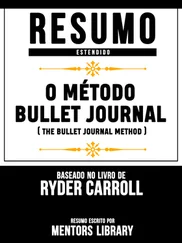Yesterday evening, two of Handel’s organ concertos, in B-flat major and G minor, from Stuttgart. Very Mozart-Haydn. Could I tell him apart from those other two?
For a week now, beginnings of revolution at the Bar. A few meetings campaigning for a “numerus clausus.” 7On Saturday, the day before yesterday, Istrate Micescu spoke and went right over to the Movement. 8It is exactly a week since my interview with him appeared. I am obviously losing my touch.
What people! Made of whey, yogurt, and water. M[icescu] told me the other day: “If you want to know who is my master in politics, it is Alain.” He spoke then about freedom, about individual resistance to the state, about the stupid idea of a “collective” and how it is exploited by dictatorships. And now look at him, an anti-Semite gone over to the “national revolution.”
Nae has had a hand in this too. Micescu admitted to Froda 9that he had had a visit from Nae, who had urged him to take the leadership of what was happening at the Bar. Look at how the professor is going to make a new Romania! What a cruel, ridiculous, terrible affair, in which everyone, including Nae, makes his little contribution.
But spring has come. Yesterday I went with Benu 1to Băneasa. A March wind was blowing, it was sunny, and I felt young. Not for a long time have I felt such a keen desire to be happy.
Midnight
I have come tired from the station (got up at 6 a.m. to go to Brăila, now I am back). But I don’t want to leave this note until tomorrow, having vowed in the train to write it.
I traveled with Nae Ionescu. He was going to give a lecture in Galaţi (about “Signs and Symbols”). Nothing interesting in the morning: we read the papers, talked politics, and had a pleasant time chatting with a girl who had struck up a conversation with us. I got off in Brăila and we agreed to meet again in the evening on the return journey.
In the evening we did indeed find ourselves in the same compartment. Professor Vechiu, leader of Argetoianu’s 2supporters in Brăila, was also there with us. All three of us had dinner in the restaurant car. Nae put on a great political act.
It is he who got Vaida’s movement off the ground. 3(Ten days ago he assured me of exactly the opposite.) He and the Iron Guard will support him, but without taking part themselves. He recognizes that the “numerus valachius” is really a platform for agitation, not at all a political program. He accepts the fact that it cannot be implemented. “Things like that could happen only as a consequence of something else, if there were a change in the general framework.”
His plan is very simple. Keep Tătărescu 4in power for the time being— for another three months, say, until Vaida’s movement acquires solid foundations and cadres. Then a Vaida government, produced by sixty Iron Guard deputies and some ten to twenty-five from other parties, so that “the Guard will be His Majesty’s Opposition.” Logically, when this Vaida government falls, the succession will fall to the Guardists.
I do not know what chances this plan has. Rather few, I would think, and in my view he is a fantasy-monger. Quite logical, of course.
What made me feel a little sad for Nae was the tone in which he said everything. Scheming, artful, “enfant terrible.” What he said to Averescu, 5how he duped George Brătianu, 6how he got even with Vaida in Brasov. .
“I really landed them in the shit.”
I certainly prefer him in the lecture hall.
As we traveled back in the compartment, a feeling of vague unease turned into one of pain. What a poseur that man can be! There were two colonels in the compartment. He started chatting and managed to get them both “at sixes and sevens.” I could see victory on his lips, a sense of triumph at having flummoxed them. He said some bewildering things — of the kind he uses to startle people by turning the discussion from a local matter to a problem of world history. The talk was of a possible war between France and Germany.
“Rubbish! The whole crux is in Singapore. That’s where Europe is playing its cards. And it can play without Germany. That’s all there is to it.”
In Singapore? Maybe. But anyway, before the problem can be properly discussed, Nae’s bolt from the blue put an end to it. The colonels exchanged looks of admiration and astonishment, suddenly alight from the revelation of the truth. Nae could feel this and basked in the warm glow.
In one hour he retold everything I know about him: how he lived through the revolution in Munich, how he gave speeches to the revolutionary ministers, how the revolution finally put an end to the Dachau money factory, how Colonel Epp did this and did that, etc., etc. Things I heard from him years ago, riveted to the wall in his office at Cuvântul.
Then he moved on to more recent matters. To Beck in Warsaw 7he had said that it was necessary to move closer to Germany. To Karl Radek 8he had explained that Stalin’s successor would be Genghis Khan. In Berlin he had told a general this, shown a minister that. .
“And do you know Hitler personally?”
(One of the colonels threw in this question when Nae was in full flow. I well knew that he had never met Hitler. He said so categorically a year ago, and again last summer. But he was at risk of disappointing the colonel, who was so full of admiration.)
“Yes, I’ve seen him. There’s a great politician for you. You see, Trotsky, who is enormously intelligent, and Stalin, who is a fool, . (The change of tack was probably out of prudence, but he kept up the lie — a lie of pure bluster — because he could not bear to let slip any of the glory he had promised himself. What a child he is! Five minutes later, Vechiu asked him in turn, “Have you seen Hider?” And he again replied “Yes,” rapidly moving on to something else, either because he felt awkward or because he was bored with having to dream up too many things to say)
He looked as he must have fifteen years ago holding forth at the Capşa. 9How young he is, dear old Nae Ionescu!
Nae’s class yesterday was suffocating. Iron Guardism pure and simple— no nuances, no complications, no excuses. “A state of combat is what we call politics. One party contains in its very being an obligation to wipe out all the others. The final conclusion is that ‘internal politics’ is an absurdity. There can only be a conquest or seizure of power and a merging of the party with the whole collective. From that moment all that exists is household management, since all possibility of reaction has been eliminated. A collective that contains within itself the idea of war is called a nation. A nation is defined by the friend-foe equation.” And so on and so forth. .
I should have liked to tell him how monstrously he contradicted himself, but he was in too much of a hurry and left straight after the lecture.
His whole heresy stems from a wild and terrifying abstraction: the collective. It is colder, more insubstantial, more artificial than the abstraction of the “individual.” He forgets that he is speaking of human beings; that they have passions and — whatever one may say — an instinct for freedom, an awareness of their own individual existence.
Even more depressing is the fact that all those theories stem from vulgar political calculation. I am convinced that if he spoke like that yesterday — with so many political allusions and so painfully Hitler-like — it was because an Iron Guardist dressed in national costume was sitting in the front row of the audience. I could feel that he was speaking for him.
I have been listening a lot to Bach recently. Last Sunday the St. Matthew Passion at the Ateneu. I think I am really very fond of his music. In any case, I can now easily tell a piece by Bach from any other.
Читать дальше











